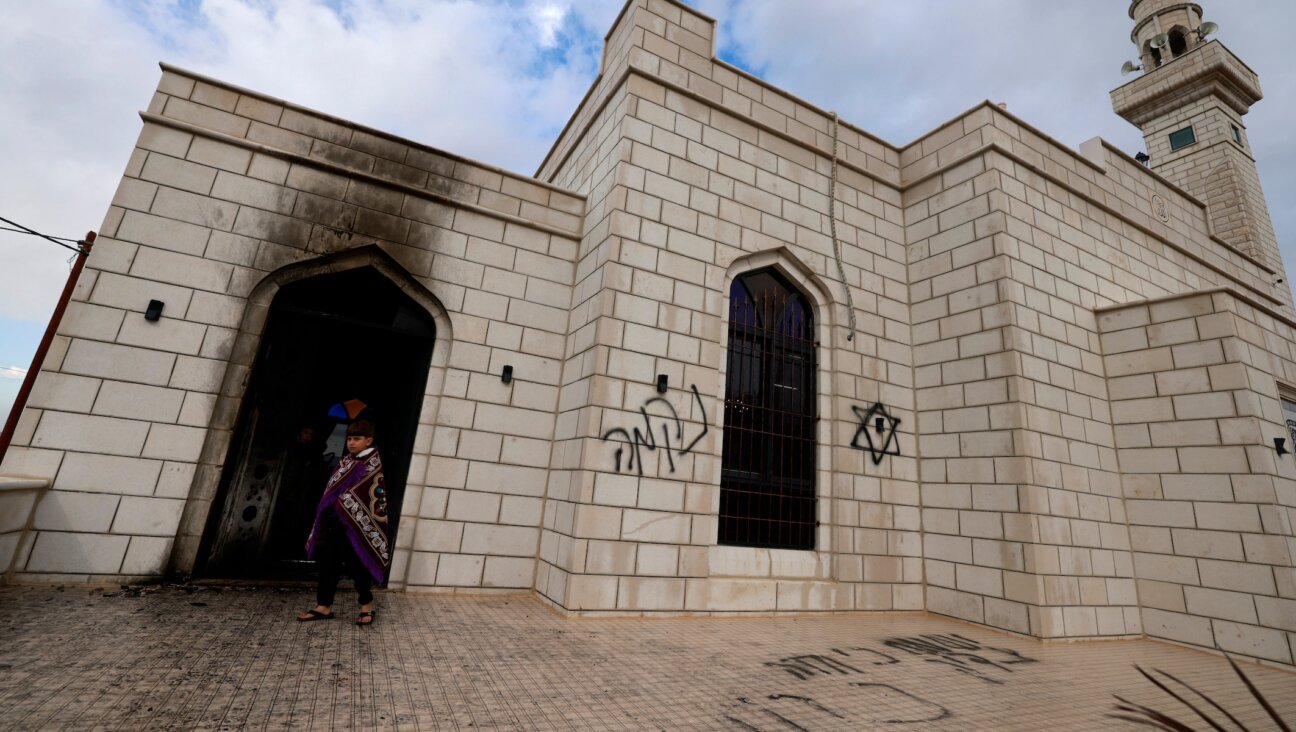Reform Parley Raps Bush Domestic Agenda
WASHINGTON — While thousands of pro-Israel activists gathered a short distance away for the annual American Israel Public Affairs Committee policy conference, with many voicing support for the Bush administration’s handling of foreign policy, leaders of America’s largest synagogue movement were focused on the president’s domestic agenda — and they were not pleased.
Speaker after speaker at the Reform movement’s three-day “Consultation on Conscience” denounced the Bush administration’s domestic policy positions, receiving robust applause from the nearly 500 Reform Jewish activists in attendance.
“This administration is the first in the history of our country to ask the sons and daughters of working men and women to risk their lives in war, while asking the wealthy to pay less taxes,” Rabbi Eric Yoffie, president of the Union of American Hebrew Congregations, told hundreds of activists at the Religious Action Center of Reform Judaism’s biennial legislative issues conference Sunday.
Yoffie said in his speech that while there is a spectrum of views in the Reform movement on the Iraq war, there is a consensus that it does “not take the place of all the other wars — against poverty, hatred and exploitation.”
The Religious Action Center’s associate director, Mark Pelavin, said that the fact that this year’s conference drew more participants than it has at any time in his memory is evidence that, despite the turmoil in the Middle East, people have not lost interest in domestic policy issues.
“People are looking for that agenda, they’re looking to find out what they can do, how they can make a difference, what are the issues where progress is possible,” he said.
The Reform movement and its Religious Action Center in Washington have a history of liberal activism. During the 1960s, many conference speakers noted, historic pieces of civil rights legislation — including the landmark 1964 Civil Rights Act and 1965 Voting Rights Act — were drafted in the center’s Washington offices.
The movement’s legislative agenda includes support for abortion rights, social welfare programs, gay rights, minimum wage laws, progressive taxation and a strong wall between church and state. The movement has also opposed Israel’s settlement policies in the West Bank and Gaza and has criticized some of the post-September 11 measures adopted by the Bush administration that other Jewish organizations have deemed acceptable, such as a recent plan by the FBI to conduct tallies of mosques as part of an effort to determine local terrorist threat levels.
Leading Democrats who addressed the conference, such as Senator Edward Kennedy of Massachusetts, House Minority Leader Rep. Nancy Pelosi of California and presidential candidates Connecticut Senator Joseph Lieberman and former Vermont governor Howard Dean, were all warmly received.
“You’re my kind of crowd,” Kennedy remarked, after receiving a burst of applause.
At times, the gathering had the feel of a Democratic rally, with the audience applauding vigorously when Rep. Christopher Van Hollen of Maryland was introduced as one of the two House Democrats to have unseated a Republican in 2002.
In contrast, the House’s sole Jewish Republican, Rep. Eric Cantor of Virginia, received a much chillier reception. While Cantor received some polite applause, questions from the audience assailing Republican policies were met with loud applause, and the congressman’s comments supporting the administration’s economic agenda were greeted by laughter and audible groaning on the part of some audience members.
Despite some evidence indicating that Jews may be shifting somewhat to the right politically, Reform movement leaders say that the values of their movement represent the mainstream of American Jewry.
“We’re finding that we are where the mainstream is, but that mainstream is not being reflected right now in the voice of the national institutions or the other organizations, so that is perhaps where we stand out,” Rabbi Marla Feldman, director of the Reform movement’s Commission on Social Action, told the Forward. “I think we are speaking for the majority of American Jews and the mainstream.”
Rabbi Andrew Bossov of Congregation Adath Emanu-El in Mount Laurel, N.J., said that the gathering served as a form of “moral therapy” for those in attendance.
“Just as religious services help remind us and encourage us, this too, in the realm of social justice helps to encourage and rekindle the fires.”
A message from our Publisher & CEO Rachel Fishman Feddersen

I hope you appreciated this article. Before you go, I’d like to ask you to please support the Forward’s award-winning, nonprofit journalism during this critical time.
We’ve set a goal to raise $260,000 by December 31. That’s an ambitious goal, but one that will give us the resources we need to invest in the high quality news, opinion, analysis and cultural coverage that isn’t available anywhere else.
If you feel inspired to make an impact, now is the time to give something back. Join us as a member at your most generous level.
— Rachel Fishman Feddersen, Publisher and CEO























